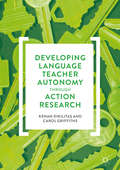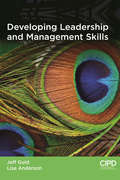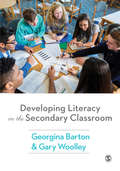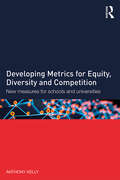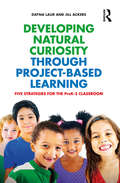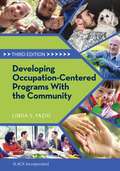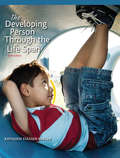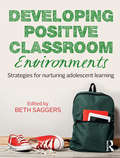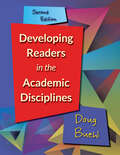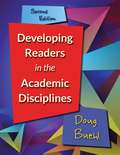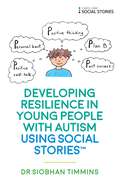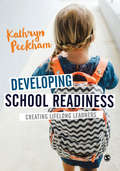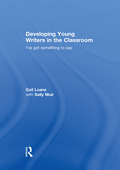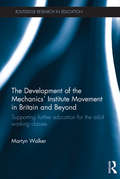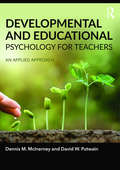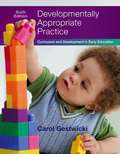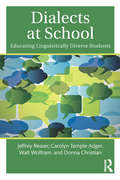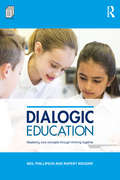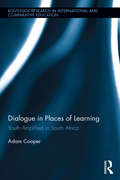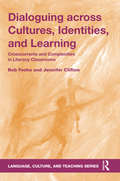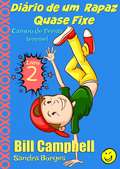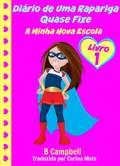- Table View
- List View
Developing Language Teacher Autonomy through Action Research
by Kenan Dikilitaş Carol GriffithsThis book advances the theory of action research, analyzing how it can be used to develop autonomy among language teachers. Although acknowledging that the research process is not always linear, the authors proceed according to a clear progression which teachers can adapt to their needs. They provide examples, narratives, questions and tasks, and give multiple ideas for establishing research questions, choosing appropriate methodologies, adapting to existing contexts, and collecting data. They also suggest possible instruments, and give clear instructions for carrying out the most common kinds of statistical procedures, and ideas for presenting, discussing, and writing up research findings. In spite of its practical bias, the book is theoretically and ethically rigorous, and contains an extensive glossary for quick and easy reference. It will appeal to trainee teachers, in-service teachers wanting to expand their own professional horizons or working for a higher qualification, and is an invaluable reference for teacher-educators and scholars.
Developing Leadership and Management Skills
by Lisa Anderson Jeffrey GoldDeveloping Leadership and Management Skills is essential reading for anyone studying the Level 5 CIPD L&D module of the same name as well as all learning and development professionals looking to develop the skills of leaders and managers in their organisation. With a thorough grounding in scientific management, leadership theories and the similarities and differences between leaders and managers, reader will fully understand the distinction between the two roles. There is also comprehensive coverage of the role of L&D in developing leaders and managers including designing learning interventions, using e-learning and blending learning, talent development, succession planning and employee engagement. Developing Leadership and Management Skills also includes guidance on how L&D professionals can ensure ownership and success of leadership and management development programmes. This includes indicators of success, individualised interventions and how to demonstrate and communicate achievement of success ensuring that L&D professionals have all the tools they need to effectively develop leaders and managers in their organisation.
Developing Literacy in the Secondary Classroom
by Georgina Barton Gary WoolleyToday’s secondary classrooms are increasingly diverse places and skilled English teachers need to be able to develop flexible teaching strategies that can be adapted to best serve diverse learners with divergent needs. This textbook for pre-service teachers gives them pragmatic guidance on the major aspects of literacy teaching, and how to draw insight research and apply it in diverse classrooms. Key coverage includes: · The fundamental aspects of teaching reading and writing to adolescent learners. · How to intelligently select and use literature with secondary students. · Multi-literacies and the use of technology in English teaching. · Assessment strategies for the classroom. · Teaching techniques for developing reading comprehension. This is essential reading for anyone training to teach English in secondary classrooms, and for recently qualified teachers looking to sharpen their practice.
Developing Literacy in the Secondary Classroom
by Georgina Barton Gary WoolleyToday’s secondary classrooms are increasingly diverse places and skilled English teachers need to be able to develop flexible teaching strategies that can be adapted to best serve diverse learners with divergent needs. This textbook for pre-service teachers gives them pragmatic guidance on the major aspects of literacy teaching, and how to draw insight research and apply it in diverse classrooms. Key coverage includes: · The fundamental aspects of teaching reading and writing to adolescent learners. · How to intelligently select and use literature with secondary students. · Multi-literacies and the use of technology in English teaching. · Assessment strategies for the classroom. · Teaching techniques for developing reading comprehension. This is essential reading for anyone training to teach English in secondary classrooms, and for recently qualified teachers looking to sharpen their practice.
Developing Metrics for Equity, Diversity and Competition: New measures for schools and universities
by Anthony KellyDeveloping Metrics for Equity, Diversity and Competition is a groundbreaking book in the field of educational research. Equity, diversity and competition are critical to our understanding of social justice and the provision of effective education for everyone, and this book develops a new coherent scientific approach to measuring them. New theory and methodologies based on previous research by the author are introduced in school and university settings. They are mathematical in nature, but have a wide range of applications within mixed-methods approaches and include: warranted weighting systems for constructing league tables game theoretic approaches to analysing power and influence indices for measuring equity in student attainment indices for measuring competition modelling the educational awards market calculating the optimal size of research groups measuring diversity. The book is an ideal resource for educational researchers, policy-makers and high-level practitioners, and those who want to explore the possibilities of using novel approaches to address the problems faced by schools, colleges and universities in the new education landscape.
Developing Natural Curiosity through Project-Based Learning: Five Strategies for the PreK–3 Classroom
by Dayna Laur Jill AckersDeveloping Natural Curiosity through Project-Based Learning is a practical guide that provides step-by-step instructions for PreK–3 teachers interested in embedding project-based learning (PBL) into their daily classroom routine. The book spells out the five steps teachers can use to create authentic PBL challenges for their learners and illustrates exactly what that looks like in an early childhood classroom. Authentic project-based learning experiences engage children in the mastery of twenty-first-century skills and state standards to empower them as learners, making an understanding of PBL vital for PreK–3 teachers everywhere.
Developing Occupation-Centered Programs with the Community
by Linda S. FazioThe Third Edition includes new and updated content on evidence-based practice; program evaluation at multiple levels; funding; nonprofits and social entrepreneurship. Additionally, new trending issues of interest to programmers include human trafficking, post-combat programming for military veterans and their families, arts-based programming for all ages, and programming to meet current needs of the well-elderly. The features of the Third Edition are: Workbook format offers the instructor and the student options for how to use the text in a classroom or independently in an internship or residency. <P><P> The order of the programming process, chapter content order, summaries, and format of exercises has been retained to ease transition for instructors using previous editions of the text. The program “story” section has been retained, along with author’s notes on what is currently happening with these programs and other related topic areas. New content has been added in program sustainability, the assessment and building of community assets, and consensus organizing in communities. More developed content is offered about the structure and function of nonprofit organizations as well as the role and function of the social entrepreneur who does programming for these organizations.
The Developing Person Through the Life Span
by Kathleen BergerWith Kathleen Stassen Berger's always contemporary, always compelling textbook, students learn to see how the basic ideas of developmental psychology apply to their own lives, the lives of those around them, and the lives of others of all life stages and in cultures all around the world. Berger's narrative voice, wide-ranging cultural perspective, and focus on universal themes captivate students from the outset, helping them grasp the important theoretical and scientific work driving the field of developmental psychology today.
Developing Positive Classroom Environments: Strategies for nurturing adolescent learning
by Beth SaggersThe middle years of learning are increasingly recognised as one of the most challenging yet opportune periods for growth and development. Based on the Positive Behaviour Support (PBS) framework, this book will equip educators with the appropriate knowledge, skills and strategies to support learners in maximising their educational success, managing emotional issues and making a successful transition to adulthood. Part A outlines the principles of the PBS framework, defines key characteristics of middle-years learners and provides insight from neuroscience into the nature of the adolescent brain. This section also looks at the importance of listening to the student voice, highlights issues that can arise during the transition into the middle years of schooling, and discusses the use of evidence-based PBS practices to encourage engagement and establish clear behavioural expectations with learners. Part B focuses on the practical aspects of implementing universal PBS strategies in the classroom, including developing strong and effective relationships with students, promoting school connectedness and supporting self-regulation. Part C examines more focused and intensive interventions, and provides strategies for working with students experiencing stress, anxiety and bullying. Finally, Part D discusses ways to support a range of perspectives and experiences in the middle-years, including trauma-affected students, ethnic and cultural diversity and students on the autism spectrum, as well as ways to use ICT to re-engage vulnerable students. This is an essential reference for both primary and secondary educators, revealing how PBS strategies can play a profound role in positively transforming classroom behaviour.
Developing Readers in the Academic Disciplines
by Doug BuehlBeing literate in an academic discipline is more than being able to read and comprehend text; you can think, speak, and write as a historian, scientist, mathematician, or artist. Author Doug Buehl strips away the one-size-fits-all approach to content area literacy and presents an instructional model for disciplinary literacy, which honors the discipline and helps students learn within that area. In this revised second edition, Developing Readers in the Academic Disciplines shows how to help students adjust their thinking to comprehend a range of complex texts that fall outside their reading comfort zones. Inside you'll find: Instructional tools that adapt generic literacy practices to discipline-specific variationsStrategies for frontloading instruction to activate and build background knowledgeNew approaches for encouraging inquiry around disciplinary textsIn-depth exploration of the role of argumentation in informational textNumerous examples from science, mathematics, history and social studies, English/language arts, and related arts to show you what vibrant learning looks like in various classroom settings Designed to be a natural companion to Buehl's Classroom Strategies for Interactive Learning, Developing Readers in the Academic Disciplines introduces teachers from all disciplines to new kinds of thinking and, ultimately, teaching that helps students achieve new levels of understanding.
Developing Readers in the Academic Disciplines (2nd Edition)
by Doug Buehl<p>Being literate in an academic discipline means more than simply being able to read and comprehend text; it means you can think, speak, and write as a historian, scientist, mathematician, or artist. Doug Buehl strips away the one-size-fits-all approach to content area literacy and presents a much-needed instructional model for disciplinary literacy, showing how to mentor middle and high school learners to become "academic insiders" who are college and career ready. <p>This thoroughly revised second edition of Developing Readers in the Academic Disciplines shows how to help students adjust their thinking to comprehend a range of complex texts that fall outside their reading comfort zones. This book --a natural companion to Buehl's Classroom Strategies for Interactive Learning, which has been bolstering student comprehension for almost three decades--provides the following supports for teachers: <p> <li>Instructional tools that adapt generic literacy practices to discipline-specific variations <li>Strategies for frontloading instruction to activate and build background knowledge <li>New approaches for encouraging inquiry around disciplinary texts <li>In-depth exploration of the role of argumentation in informational text <li>Numerous examples from science, mathematics, history and social studies, English/language arts, and related arts to show you what vibrant learning looks like in various classroom settings</li> <p> <p>Developing Readers in the Academic Disciplines introduces teachers from all disciplines to new kinds of thinking and, ultimately, teaching that helps students achieve new levels of understanding.
Developing Resilience in Young People with Autism using Social Stories™
by Siobhan TimminsYoung people with autism can be particularly susceptible to setbacks, often leading to depression and a sense of hopelessness. Using Social Stories™, this book introduces a different way of looking at common life setbacks, and offer tools to overcome these obstacles, build resilience and develop coping strategies for the future. Based on Carol Gray's highly effective Social Stories™ model, this new guide shows how to help individuals with autism deal with challenges specific to them, and how to bounce back from the negative experiences that they encounter. This book is an invaluable guide for learning to create personalised Social Stories™ that can be used to develop resilience in people with autism and help them to cope better with adversity.
Developing School Readiness: Creating Lifelong Learners
by Kathryn PeckhamShortlisted for Best Professional Book by Nursery World Awards 2017! We've all heard of the term school readiness but how many of us understand what is meant by it? What does it mean in the context of child development and wellbeing and what implications does it have for creating enthusiastic lifelong learners? How can we really give our children the best start in their most formative years? This book will ensure you understand school readiness but also understand: the experiential nature of children's learning how future success is affected by the experiences that have gone before the importance of your role in the child’s journey This book will give you the confidence to deliver practice that exceeds expectations and the knowledge to stand by your approach to teaching and caring for the children you work with. Kathryn Peckham will be discussing key ideas from Developing School Readiness: Creating Lifelong Learners in the SAGE Early Years Masterclass, a free professional development experience hosted by Kathy Brodie. To sign up, or for more information, click here.
Developing School Readiness: Creating Lifelong Learners
by Kathryn PeckhamShortlisted for Best Professional Book by Nursery World Awards 2017! We've all heard of the term school readiness but how many of us understand what is meant by it? What does it mean in the context of child development and wellbeing and what implications does it have for creating enthusiastic lifelong learners? How can we really give our children the best start in their most formative years? This book will ensure you understand school readiness but also understand: the experiential nature of children's learning how future success is affected by the experiences that have gone before the importance of your role in the child’s journey This book will give you the confidence to deliver practice that exceeds expectations and the knowledge to stand by your approach to teaching and caring for the children you work with. Kathryn Peckham will be discussing key ideas from Developing School Readiness: Creating Lifelong Learners in the SAGE Early Years Masterclass, a free professional development experience hosted by Kathy Brodie. To sign up, or for more information, click here.
Developing Young Writers in the Classroom: I've got something to say
by Gail LoaneEducators want young people to grow up knowing that writing is an important and deeply satisfying life skill, one that helps them make more sense of themselves and their world, and one that helps them to communicate effectively. Sadly, too often writing becomes merely an exercise in ‘getting words right’, or writing to teacher-prescribed tasks. Developing Young Writers in the Classroom explores the principles of developing literacy through authorship, allowing children to describe, question and celebrate their own experiences and personal creativity. The book offers detailed guidance, supported by planning documents, poetry and prose, examples of children’s work and stimulating visuals. Inspiring topics explored include: creating a classroom environment which supports an independent writer students’ lives brought into the classroom finding significance in our experiences the use of memoir for recording experiences description in all kinds of writing choosing and writing about a character writing in all curriculum areas linking reading and writing using other authors as mentors and teachers collaborative learning. Illustrated throughout with accessible activities and ideas from literature and poetry, Developing Young Writers in the Classroom is an essential resource for all teachers wishing to inspire writing in the classroom.
The Development of the Mechanics' Institute Movement in Britain and Beyond: Supporting further education for the adult working classes (Routledge Research in Education)
by Martyn WalkerThe Development of the Mechanics’ Institute Movement in Britain and Beyond questions the prevailing view that mechanics’ institutes made little contribution to adult working-class education from their foundation in the 1820s to 1890. The book traces the historical development of several mechanics’ institutes across Britain and reveals that many institutes supported both male and female working-class membership before state intervention at the end of the nineteenth century resulted in the development of further education for all. This book presents evidence to suggest that the movement remained active and continued to expand until the end of the nineteenth century. Drawing on historical accounts, Walker describes the developments which shaped the movement and emphasises the institutes’ provision for scientific and technical education. He also considers the impact that the British movement had on the overseas development of mechanics’ institutes – particularly in Canada, America, Australia and New Zealand. The book concludes with a discussion of the legacy of the movement and its contribution to twentieth-century adult education. The Development of the Mechanics’ Institute Movement advances the argument that the movement made a substantial contribution to adult education for the working classes and provided a firm foundation for further education in Britain and beyond. It will appeal to academics, researchers and postgraduate students in the areas of education, history and sociology, as well as the philosophy of education, technical and vocational education, and post-compulsory education.
Developmental and Educational Psychology for Teachers: An applied approach
by Dennis McInerney David PutwainDevelopmental and Educational Psychology for Teachers brings together a range of evidence drawn from psychology to answer a number of critical educational questions, from basic questions of readiness – for example, when is a child ready for school, through to more complex matters, such as how does a teacher understand and promote good peer relationships in their classroom? The answers to these and other questions discussed draw here on the interplay between a teachers’ craft expertise and their knowledge of evidence and theory from developmental and educational psychology. Presenting a range of classic theories and contemporary research to help readers understand what the key issues are for teachers and other professionals, this book aides informed educational decisions in situations such as: inclusion, ability grouping, sex differences, developing creativity, home and peer influences on learning, and developing effective learners. Teachers in early years, primary and secondary settings are routinely faced with questions regarding the development of children. This not only relates to the planning and delivery of lessons, but also to the mental and physical wellbeing of the children and adolescents that they teach. The pedagogical features of this book are accessible and clearly presented, including focus questions that direct the reader’s attention to key issues, activity posts that point the reader to meaningful and relevant research and show the practical applications of material covered, and extension material that gives depth to many of the topics covered. This book aims to inform the practice of both in-service and trainee teachers, addressing issues that are relevant to their practice. With no other detailed and accessible text presenting this evidence and theory specifically for an audience of practicing and trainee teachers currently on the market, this book will be of essential reading to practicing and trainee teachers for early years, primary and secondary education and other related educational contexts such as educational psychologists, counsellors, paediatric and child doctors and nurses.
Developmentally Appropriate Practice: Curriculum and Development in Early Education (Sixth Edition)
by Carol GestwickiThoughtful and comprehensive, DEVELOPMENTALLY APPROPRIATE PRACTICE: CURRICULUM AND DEVELOPMENT IN EARLY EDUCATION, 6th Edition, is designed to meet the needs of new early childhood students as well as experienced teachers, professionals, and parents. It provides you with an overview of the concepts and theoretical foundations of appropriate practices in every developmental domain and discusses the practical implications for teachers and caregivers. The text reflects the NAEYC position statement on Developmentally Appropriate Practice and includes content on aligning early childhood teaching practices with national education standards, in addition to many interesting anecdotes, vignettes, interactive features, and applications to help you understand and apply the material. The text also shows you how to be effective no matter what curriculum model is used in your center, whether Reggio Emilia, Montessori, High Scope, Creative Curriculum, Bank Street, Waldorf, or any other.
Dialects at School: Educating Linguistically Diverse Students
by Carolyn Temple Adger Donna Christian Jeffrey Reaser Walt WolframLike its predecessor, Dialects in Schools and Communities, this book illuminates major language-related issues that educational practitioners confront, such as responding to dialect related features in students’ speech and writing, teaching Standard English, teaching students about dialects, and distinguishing dialect difference from language disorders. It approaches these issues from a practical perspective rooted in sociolinguistic research, with a focus on the research base for accommodating dialect differences in schools. Expanded coverage includes research on teaching and learning and attention to English language learners. All chapters include essential information about language variation, language attitudes, and principles of handling dialect differences in schools; classroom-based samples illustrating the application of these principles; and an annotated resources list for further reading. The text is supported by a Companion Website (www.routledge.com/cw/Reaser) providing additional resources including activities, discussion questions, and audio/visual enhancements that illustrate important information and/or pedagogical approaches. Comprehensive and authoritative, Dialects at School reflects both the relevant research bases in linguistics and education and educational practices concerning language variation. The problems and examples included are authentic, coming from the authors’ own research, observations and interactions in public school classrooms, and feedback in workshops. Highlights include chapters on oral language and reading and writing in dialectally diverse classrooms, as well as a chapter on language awareness for students, offering a clear and compelling overview of how teachers can inspire students to learn more about language variation, including their own community language patterns. An inventory of dialect features in the Appendix organizes and expands on the structural descriptions presented in the chapters.
Dialogic Education: Mastering core concepts through thinking together (Computer-Supported Collaborative Learning Series #7)
by Neil Phillipson Rupert WegerifDialogue has long been used in primary classrooms to stimulate thinking, but it is not always easy to unite the creative thinking of good dialogue with the need for children to understand the core concepts behind knowledge-rich subjects. A sound understanding of key concepts is essential to progress through the national curriculum, and assessment of this understanding along with effective feedback is central to good practice. Dialogic Education builds upon decades of practical classroom research to offer a method of teaching that applies the power of dialogue to achieving conceptual mastery. Easy-to-follow template lesson plans and activity ideas are provided, each of which has been tried and tested in classrooms and is known to succeed. Providing a structure for engaging children and creating an environment in which dialogue can flourish, this book is separated into three parts: Establishing a classroom culture of learning; Core concepts across the curriculum; Wider dialogues: Educational adventures in the conversation of mankind. Written to support all those in the field of primary education, this book will be an essential resource for student, trainee and qualified primary teachers interested in the educational importance of dialogue.
Dialogue in Places of Learning: Youth Amplified in South Africa (Routledge Research in International and Comparative Education)
by Adam CooperShowing how youth from one of the poorest and most violent neighborhoods in Cape Town, South Africa, learn differently in three educational contexts— in classrooms, in a community hip hop crew, on a youth radio show—this book illuminates how South African schools, like schools elsewhere, subtly reproduce inequalities by sorting students into social hierarchies linked to assessments of their use of language. Highlighting the voices and perspectives of young South Africans, this case study of youth in the global South explores how language is linked to cultural mixing which occurred during colonialism and slavery and continues through patterns of global mobility. Dialogue in Places of Learning: Youth Amplified in South Africa demonstrates how language and learning are bound to space and place.
Dialoguing across Cultures, Identities, and Learning: Crosscurrents and Complexities in Literacy Classrooms (Language, Culture, and Teaching Series)
by Bob Fecho Jennifer CliftonDrawing on Dialogical Self Theory, this book presents a new framework for social and cultural identity construction in the literacy classroom, offering possibilities for how teachers might adjust their pedagogy to better support the range of cultural stances present in all classrooms. In the complex multicultural/multiethnic/multilingual contexts of learning in and out of school spaces today, students and teachers are constantly dialoguing across cultures, both internally and externally, and these cultures are in dialogue with each other. The authors unpack some of the complexity of culture and identity, what people do with culture and identity, and how people navigate multiple cultures and identities. Readers are invited to re-examine how they view different cultures and the roles these play in their lives, and to dialogue with the authors about cultures, learning, literacy, identity, and agency.
El Diario de Julia Jones, Libro 6 - Cambios
by Katrina Kahler Cinta Garcia de la Rosa¡Todo es perfecto en el mundo de Julia! Tenía el mejor novio del mundo. Tiene la más increíble de las mejores amigas. ¡Su banda va genial! Ya casi ha terminado el colegio y está realmente deseando que llegue la graduación. Entonces, ¿qué podría ir mal? ¿Qué podría poner el mundo de Julia patas arriba? ¿Habéis tenido alguna vez la sensación de que alguien está obsesionado con vosotras? Al principio sientes que solo se trata de tu imaginación... luego te das cuenta de que algo va mal. Empieza a volverse siniestro y en realidad no estás segura de qué hacer... Lee cómo Julia le hace frente a "él". Y algunas veces no importa lo feliz que seas, o lo perfecta que sea tu vida... los cambios suceden. Cambios que estás segura van a destruir tu vida "perfecta". El Diario de Julia Jones, Libro 6 - "Cambios" hará que tu corazón sonría, que se te erice el pelo de la nuca, y que sientas mariposas en el estómago. Otro fabuloso añadido a la serie del Diario de Julia Jones que a todas las seguidoras de Julia Jones les va a encantar.
Diário de um Rapaz Quase Fixe Livro 2 Campo de Férias terrível
by Bill Campbell Sandra BorgesUm livro divertifo para as crianças: O campo de férias é suposto ser divertido... certo? O AJ não parece convencido, especialmente quando chega e vê o seu velho inimigo Cedric! Felizmente não estão na mesma cabana! Infelizmente, têm de competir um com o outro para ganhar a Competição do Campo de Férias. O Cedric começa a jogar sujo contra a cabana do AJ. Será que o AJ, o Hawk e o Mike vão conseguir se vingar? Quem sairá vencedor? Este é o segundo livro daa série Diário de Um Rapaz Quase Fixe. É perfeito para rapazes e raarigas que gostam de livros engraçados.
Diário de Uma Rapariga Quase Fixe
by Carina Mota Bill CampbellUma nova escola… um novo começo. Bem, pelo menos é o que a Madonna espera. Ela é uma rapariga “normal”, bem, mais ou menos. Não está no grupo dos populares, mas também não é uma nerd. Está no meio dos dois e a tentar integrar-se. Segue as suas aventuras hilariantes na sua nova escola. Aposto que te consegues relacionar com montes delas! Este livro é adequado para raparigas ou rapazes dos 8 aos 12 anos de idade. Se gostaste do Diário de um Miúdo Fracote, provavelmente vais gostar deste livro. É sobre uma rapariga que é “quase fixe”, amável, forte e muito, muito engraçada. Diário de Uma Rapaz Quase Fixe acabou de ser lançado e é tão engraçado e divertido como este livro!
